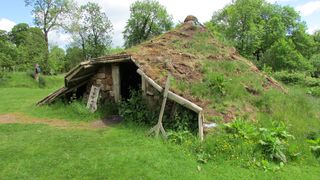Note: This post was written by guest author and evolutionary psychology enthusiast, Annette Taylor (whose evolutionary psychology pen name is Claire).
"We share the same biology, regardless of ideology." —Sting
Ah, biology. It’s what binds us together as humans. Crazy how it has taken a pandemic to remind us of that fact. For the past two and a half men—I mean years—I have been studying our evolution as people. As I see it, there have been three major stages of development: how we lived as tree-dwellers, how we lived as cave-dwellers, and how we live as house-dwellers.
For me, cave-dwelling was the sweet spot. It’s when we learned to trust each other, and I have come to imagine that each of us has a cave-dweller inside of us that still influences some of our behavior as modern humans. I’ve named my inner cave-dweller Claire, and she has some observations for you to consider as you endure the next few weeks/months of safe sheltering.
In short, even though you could say we are just hanging out in our caves, this much house-dwelling is gonna be really hard. That’s partly because Claire and internal cave-dwellers like her are going to be wondering what the heck is going on.

10. Cave-dwellers moved a lot.
Rain and physical limitations excluded, your “I don’t have time” excuse for not getting out and exercising is gone. (No equipment is required.)
9. Cave-dwellers hung out with about 100 people.
Being with just a few people for a long period of time is not natural—but neither is hanging out with more than 150 others.
8. Cave-dwellers did stuff together.
Except for the youngest, all members of a tribe participated in reaching goals. Cook together or do a puzzle instead of just playing competitive games.
7. Cave-dwellers conserved their energy.
House-dwellers use modern tools to conserve their energy and can do a lot of things at once. Try only doing one thing at a time. For now, there’s no rush.
6. Cave-dwellers conserved and shared resources.
Pretend there is no more of whatever you are using. And leave something on the grocery shelves for someone else.
5. Cave-dwellers didn’t know what was going to happen next.
Anxiety is modern. Try not to guess what will happen next and limit your intake of news. Keep calm and carry on.
4. Cave-dwellers depended on each other.
If you were not trustworthy, you got kicked out of a tribe. Face-to-face was the only option. Use any media connections thoughtfully.
3. Cave-dwellers knew what they were good at.
People with more testosterone than estrogen tend to feel good when they are making obvious changes to their environment. People with more estrogen than testosterone tend to feel good when they work with what’s happening around them. Either way, they contribute.
2. Cave-dwellers learned from each other constantly, sometimes through stories.
Binge your shows, but don’t tune out. Adults (should) have power. If you have kids, they are watching you. (And go easy on adult beverages—they are just quieting your sense of obligation anyway.)
1. Cave-dwellers did not expect perfection. Loose schedules or checklists are the way to go.
Bottom Line
I hope Claire’s Survival Guide helps clarify why we might be feeling so anxious while we safe-shelter and gives you some ideas on how we can handle ourselves. I also hope these observations will help make it a little easier to follow the rules. And if you see people out interacting when they should be at home, you may now be able to understand why they are risking their health—they might be caving to a few of their prehistoric habits/instincts. But just because we have these instincts does not mean we need to follow them.
As humans, we have evolved to the point we can make other choices besides just the ones that make us feel good. And just acknowledging we have unconscious habits is the first step. Thanks for reading!

Annette Taylor has an M.A. in Educational Psychology from California State University, Northridge. She is a wife, a mother of two, and a really big fan of Evolutionary Psychology.


